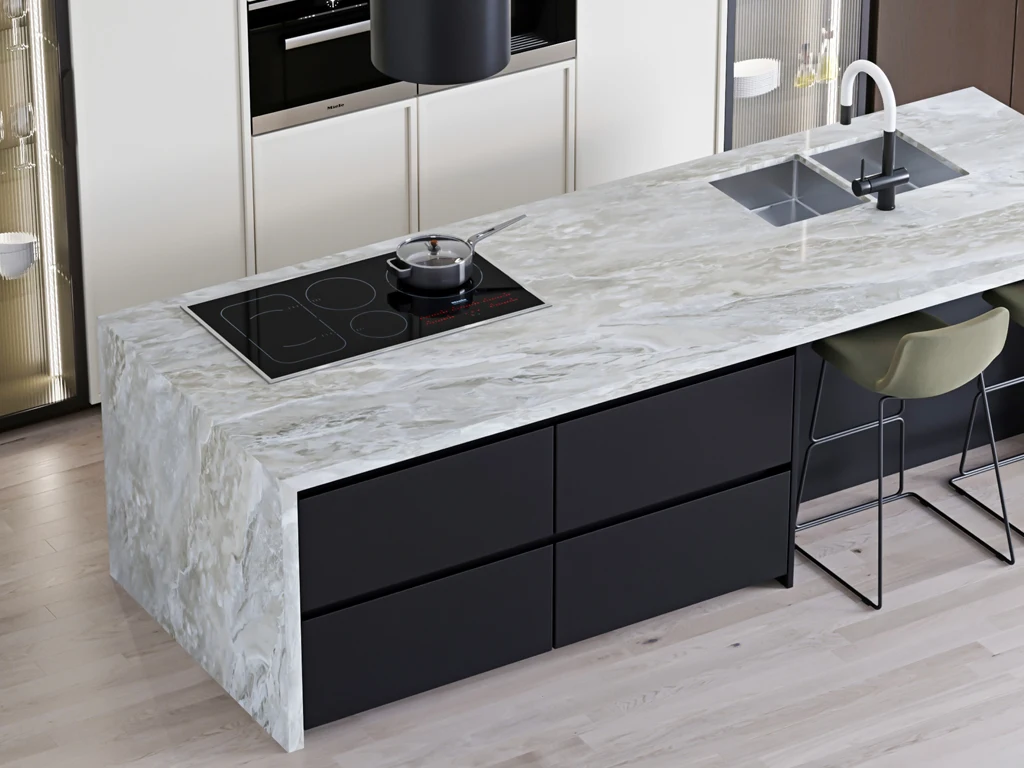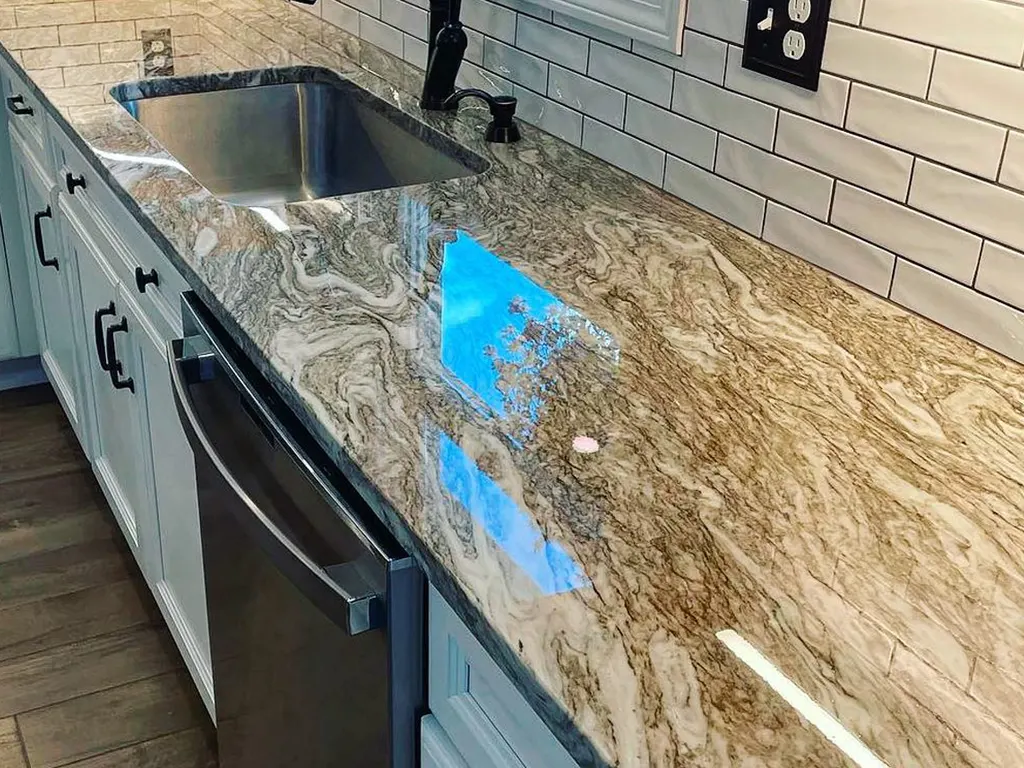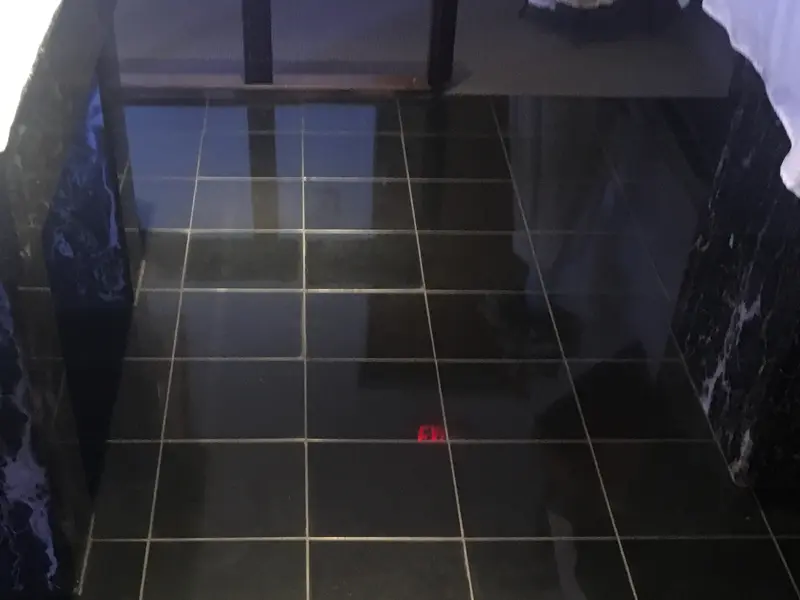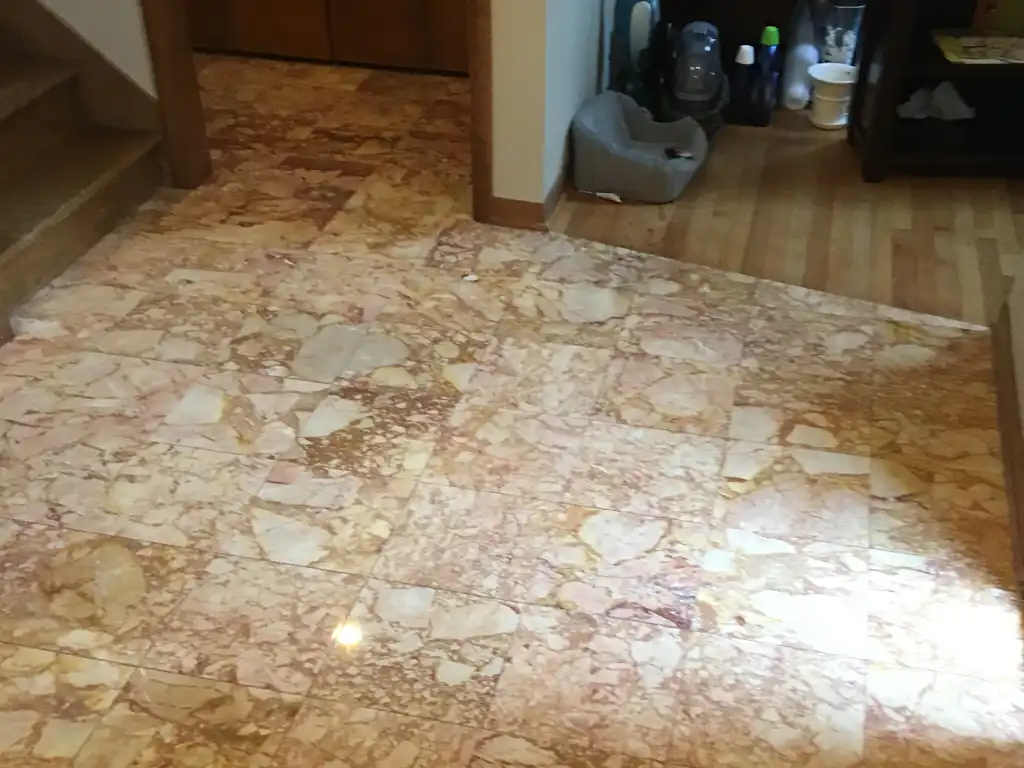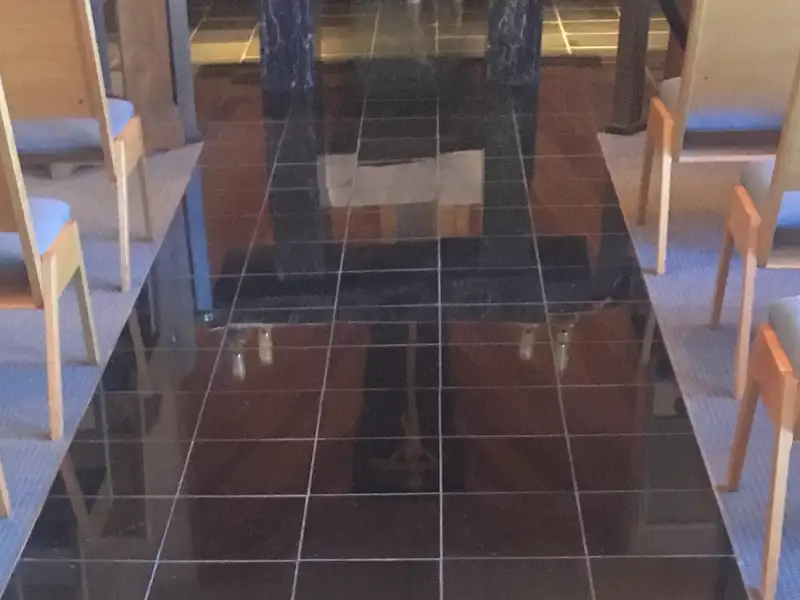Tri-State Marble Countertop Care Service is aware that some Philadelphia residents prefer to tackle home improvement tasks alone. We can offer you useful advice and instructions if you want to polish your marble countertops yourself. A DIY project can be beneficial even though professional marble countertop polishing is usually advised for the best results. To ensure you achieve a lovely and polished surface, we will walk you through the process of DIY marble countertop polishing in this post.
Please be advised that DIY marble countertop polishing involves hazards and that outcomes may differ. Before starting any DIY project, it's important to use caution, abide by safety precautions, and evaluate the state of your marble countertops.
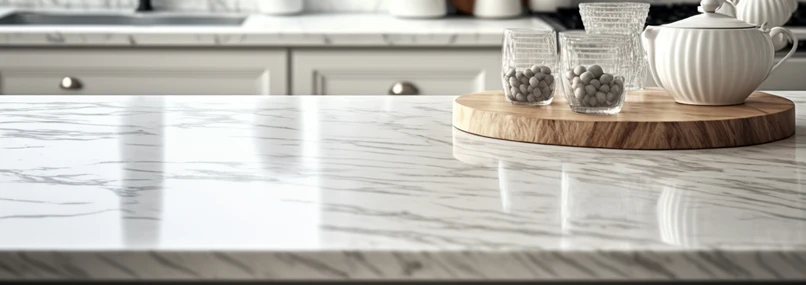
- Gather the Necessary Supplies: Gather the following materials before beginning the DIY marble countertop polishing procedure:
- Soft Microfiber Towels
- Non-abrasive cleaning made especially for marble surfaces
- Polishing paste or powder for marble
- Water
- Polishing Cloth or Handheld Buffer
- Marble sealer (optional)
- Clean the Countertop: To start, thoroughly clean the countertop to get rid of any dirt, debris, or stains. Make use of a non-abrasive cleaning designed especially for marble surfaces. Use a soft microfiber towel to clean the countertop according to the manufacturer's directions. Before continuing, make sure the surface is totally dry.
- Test in an Inconspicuous Area: It is recommended to test any polishing chemical or powder in a small, discrete area of the countertop before applying it more broadly. This will enable you to assess whether the product is appropriate for your marble and whether the intended effects are obtained.
- Apply Marble Polishing Compound or Powder: Should the test results be positive, continue to apply the marble polishing compound or powder. To make a paste, combine the compound or powder with water according to the manufacturer's recommendations. Place a small amount of paste on the countertop at a time.
- Polish the Countertop: Gently wipe the polishing paste or powder onto the countertop's surface using a delicate microfiber cloth. Apply minimal pressure while working in small circular motions. Up until the desired level of shine, keep polishing. Maintain calm and refrain from applying too much pressure, which could harm the marble.
- Rinse and Wipe Clean: Once you're happy with the polishing results, properly rinse the countertop with clean water to get rid of any polishing compound or powder residue. With a gentle microfiber towel, dry-clean the countertop.
- Optional: Seal the marble. Although not required, applying a marble sealer to maintain the polished surface is advised. Make sure the countertop is totally dry before applying a sealer, if you decide to do so. Utilizing a fresh cloth or sponge, apply the sealer evenly as directed by the manufacturer. Permit the sealer to dry for the allotted amount of time.
- Ongoing Maintenance: To keep your DIY polished marble countertop looking beautiful and shiny, follow these care tips:
- In order to avoid stains or etching, remove spills right away.
- A pH-neutral cleaner designed especially for marble surfaces.
- Steer clear of using scouring pads or scrub brushes with sharp edges that could damage the Marble.
- To prevent scuffing, place cutting boards beneath blades and use coasters under glasses.
- Frequently wipe down the countertop with a soft microfiber cloth.
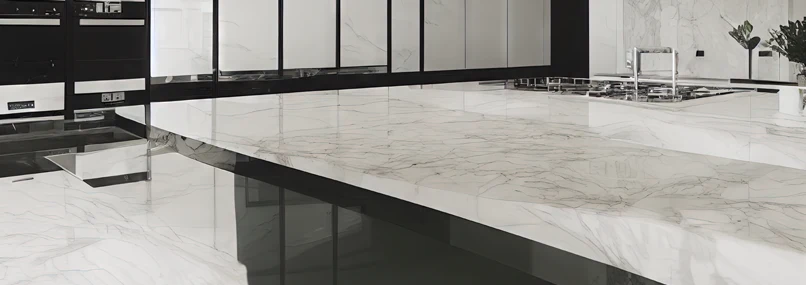
Philadelphia homeowners who prefer performing their own home maintenance work may find that DIY marble countertop polishing is a worthwhile job. However, it's crucial to keep in mind that for best results, expert marble countertop polishing is advised. Follow the advice and methods offered above, use caution, and evaluate the state of your marble countertops before you begin any DIY marble countertop polishing. While DIY polishing might help your marble surfaces regain some shine, it could not produce results as good as those produced by professionals.
The best course of action is to seek the advice of experts like Tri-State Marble Countertop Care Service if you have any questions regarding the procedure or want to make sure the finish is impeccable and long-lasting. We can offer exceptional results and guarantee the beauty and longevity of your marble countertops since we have the knowledge, experience, and specialist equipment needed. For expert marble countertop polishing services in Philadelphia, get in touch with us right away. Our qualified specialists will bring out the full brightness of your marble surfaces.
A Step-by-Step Guide to Polishing Marble Countertops in Philadelphia
Marble countertops are a preferred option for Philadelphia homeowners because of its elegance and sophistication. But over time, regular use, cleaning agents, and general wear and tear can cause marble's inherent luster to deteriorate. Polishing your marble countertops in Philadelphia is a terrific way to maintain its brilliance and beauty. To help you obtain a gorgeous, polished surface, we will walk you through the process of polishing marble countertops in this step-by-step manual.
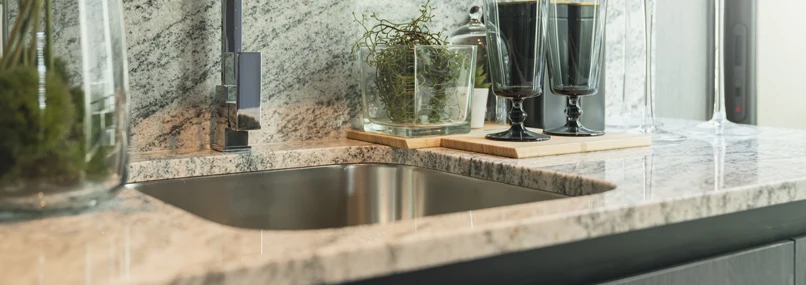
Step 1: Gather the Required Supplies: Gather the following tools before you start polishing your marble countertops.
Step 2: Properly Clean the Countertop: Get rid of any dirt, debris, or stains. Utilize a non-abrasive cleaning designed especially for marble surfaces. Use a soft microfiber towel to clean the countertop according to the manufacturer's directions. Before moving on to the following stage, make sure the surface is totally dry.
Step 3: Evaluate the Countertop's Condition: Examine the condition of your marble countertops in detail. Before polishing, make note of any severe etching, stains, or scratches that may need further restoration. If there are serious problems, it is best to seek guidance and assistance from a specialized marble maintenance service.
Step 4: Applying the Marble Polishing Compound or Powder: It's time to apply the marble polishing compound or powder once the countertop has been thoroughly cleaned and dried. By combining the polishing compound or powder with water, make a paste as directed by the manufacturer. The paste should have a thick enough consistency to stick to the surface.
Step 5: Polish the Countertop: Apply the marble polishing paste to the countertop in tiny sections at a time using a delicate microfiber cloth. Circularly rubbing the paste onto the surface is gentle. Apply light to moderate pressure, paying special attention to the regions that need it. Up until the desired level of shine, keep polishing.
Step 6: Rinse and Clean Up: Once you're happy with the results of the polishing, thoroughly rinse the countertop with clean water to get rid of any polishing compound or powder residue. With a gentle microfiber towel, dry-clean the countertop. To prevent leaving behind any film or residue, take care to completely remove all signs of the polishing paste.
Step 7: Optional Use a Marble Sealant: Consider using a marble sealer to increase the protection and durability of your polished marble countertops. In order to prevent etching, spills, and stains, marble is sealed. Apply the sealer evenly to the countertop's surface as directed by the manufacturer, using a clean cloth or sponge. Before utilizing the countertop, let the sealer fully dry.
Step 8: Constant Upkeep: Follow these upkeep suggestions to keep your polished marble countertops in Philadelphia looking beautiful and shiny:
- Clean up spills right away to avoid etching or stains.
- When cleaning marble surfaces, make sure to use a pH-neutral Cleaner.
- Steer clear of using scouring pads or scrub brushes with sharp edges that could damage the marble.
- To prevent scuffing, place cutting boards beneath blades and use coasters under glasses.
- Frequently wipe down the countertop with a soft microfiber Cloth.
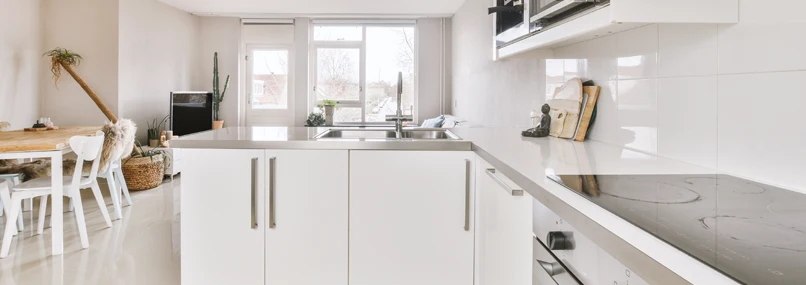
The satisfying process of polishing your marble countertops in Philadelphia may bring back their original beauty and sheen. You can get fantastic outcomes by adhering to the above step-by-step guide. However, it's crucial to use caution and keep in mind that marble is a delicate material. The best course of action is to get in touch with a reliable marble maintenance agency in Philadelphia if you're unsure or would like professional advice.
Tri-State Marble Countertop Care Service has the knowledge, practical experience, and specific equipment needed to perfectly polish marble surfaces. Our knowledgeable specialists can produce excellent results while protecting your counters because they are familiar with the nuances of marble. Maintaining the luster and beauty of your marble countertops with routine cleaning and good care will prolong their longevity and keep them looking gorgeous for years to come, whether you decide to do the project yourself or seek expert assistance.
Polishing Marble Countertops with Diamond Pads: A Comprehensive Guide in the Philadelphia Area
Regular maintenance is essential to maintain the gloss and luster of marble surfaces, which emanate ageless beauty and elegance. Using diamond pads is a successful technique if you live in the Philadelphia area and want to polish your marble surfaces. This thorough guide will show you how to polish marble surfaces with diamond pads, resulting in a beautiful and polished appearance.
Get the required materials together before you start:
- Diamond polishing cloths with grit sizes ranging from coarse to fine
- Water
- A Variable-Speed Polisher
- and a Spray bottle or wet polishing system
- Gentle Microfibre Towels
- A Nonabrasive Cleanser made especially for Marble Surfaces
- Marble Sealant, if desired
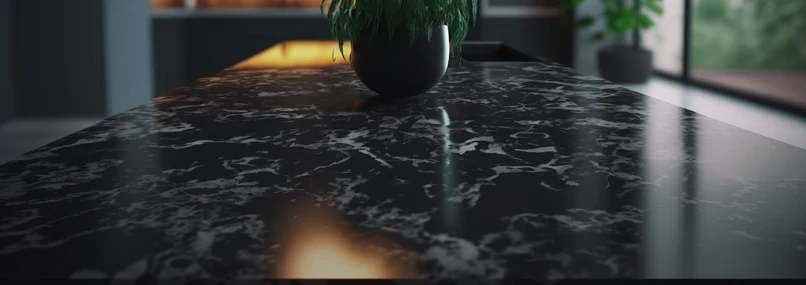
Step 1: Prepare the Countertop: Start by using a non-abrasive cleanser designed for marble surfaces to scrub the marble countertop thoroughly. Use a soft microfiber towel to clean the countertop according to the manufacturer's directions. Before continuing, make sure the surface is totally dry.
Step 2: Assess the Condition of the Countertop: Look closely at the marble countertop to spot any etching, stains, or deep scratches. Consider fixing any big problems before polishing, if there are any. If necessary, seek advice from a reputable marble maintenance company in the Philadelphia region.
Step 3: Select the Appropriate Diamond Pads: Diamond pads are available in a range of grits, from coarse to fine. The degree of abrasiveness depends on the grit level. Start with a coarse grit pad (such as 50 or 100) for initial polishing or to remove deep scratches. Use pads with increasing grit sizes for fine polishing, such as 200, 400, 800, 1500, and 3000.
Step 4: Wet the Surface: Use a wet polishing equipment or a spray bottle with water to moisten the marble countertop surface. Maintaining moisture on the surface during the procedure avoids heat buildup and guarantees efficient polishing.
Step 5: Attach the Coarse Grit Diamond Pad: Connect a variable speed polisher to the diamond pad with coarse grit. To begin, start the polisher at a low speed. Use a circular or back-and-forth motion when applying the diamond pad to the countertop surface. Focus on a tiny area at a time, being sure to cover everything evenly. Keep the pad flat and apply pressure consistently.
Step 7: Final Polishing with the Finest Grit Pad: Connect the polisher's diamond pad with the finest grit (for example, 3000). Use the same circular or back-and-forth strokes while lightly polishing the surface after applying water. The high-gloss finish is improved with this last stage.
Step 8: Clean and Dry the Countertop: Use a non-abrasive cleanser designed for marble surfaces to thoroughly clean the countertop. Dry the surface with a gentle microfiber cloth after thoroughly rinsing it with water. Make sure that any polishing-related residue has been eliminated.
Step 9: Optional: Apply a Marble Sealer: The polished surface can be protected by using a marble sealer. If desired, pick a premium marble sealer and apply it evenly by following the directions provided by the maker. Before utilizing the countertop, let the sealer fully dry.
Step 10: Ongoing Maintenance and Care: Follow these crucial upkeep and care recommendations for marble countertops in the Philadelphia region to keep their glossy appearance:
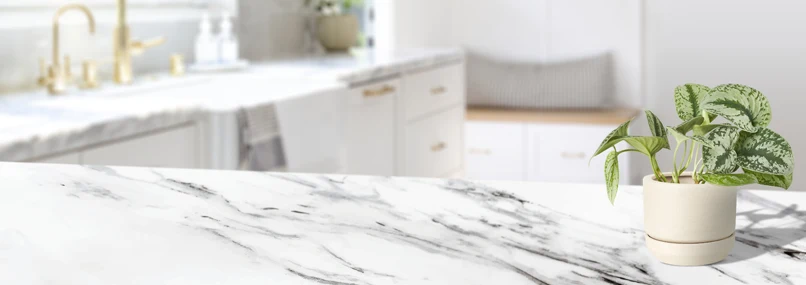
- Clean Spills Immediately: To avoid staining or etching, wipe up any spills on the countertop right away. Use a gentle, pH-neutral cleaning made especially for marble surfaces along with a soft cloth or sponge.
- Use Gentle Cleaning Products: Prevent damaging the marble surface by not using abrasive or strong cleaning agents. To keep the polished sheen intact, use only non-abrasive cleaners that are safe for marble.
- Avoid Scratching: To prevent scratches on the marble countertop surface due to hot pans or sharp items, use cutting boards, trivets, and coasters. Don't pull bulky items over the countertop.
- Regularly Wipe Down: To get rid of dirt, grime, and fingerprints, regularly wipe down the countertop surface with a soft microfiber cloth. The polished marble can keep its luster with the help of this straightforward procedure.
- Avoid Acidic Substances: Acidic chemicals, such as vinegar, lemon juice, or abrasive citrus-based cleansers, can etch and harm marble surfaces. Be careful, and clean up any spills of these substances right away.
- Use Soft Cloths or Pads: To avoid damaging or dulling the polished surface of the countertop, use soft, non-abrasive cloths or pads when cleaning or drying it.
- Reapply Marble Sealer (if applicable): If you used a marble sealer following the polishing procedure, be sure to regularly check for wear indicators and reapply the sealer in accordance with the manufacturer's instructions. The sealant lengthens the marble's lifespan and helps prevent stains.
- Schedule Regular Maintenance: Take into account arranging expert maintenance and polishing services from a reliable Tri-State Marble Countertop Care. Your countertops' condition can be evaluated by qualified professionals, who can also repair any problems and provide specialist polishing and maintenance for results that last.
You can keep your marble countertops looking beautiful and shiny for many years to come by adhering to these maintenance procedures. You may appreciate the elegance and sophistication that marble adds to your Philadelphia home with regular maintenance and the right care.
Chester County Services Area : Atglen, Avondale, Berwyn, Birchrunville, Brandamore, Chatham, Chester Springs, Coatesville, Cochranville,Devault, Devon, Downingtown, Elverson, Exton, Glenmoore, Honey Brook, Immaculata, Kemblesville, Kennett Square, Kimberton, Landenberg, Lewisville, Lincoln University, Lionville, Lyndell, Malvern, Modena, New London, Nottingham, Oxford, Paoli, Parker Ford, Parkesburg, Phoenixville, Pomeroy, Pottstown, Sadsburyville, Saint Peters, Spring City, Thorndale, Toughkenamon, Unionville, Uwchland, Valley Forge, West Chester, West Grove, Westtown
Mercer County Services Area : Carlton,Clark, Clarks Mills, Farrell, Fredonia, Greenville, Grove City, Hadley, Hermitage, Jackson Center, Jamestown, Mercer, Sandy Lake, Sharon, Sharpsville, Sheakleyville, Stoneboro, Transfer, West Middlesex, Wheatland
Other Services Area in Pennsylvania (PA) : Buckingham, New Hope, Upper Makefield, Yardley, Blue Bell, Malvern, Chester Springs, Penn Valley, Villanova, Bryn Mawr, Radnor, West Chester

